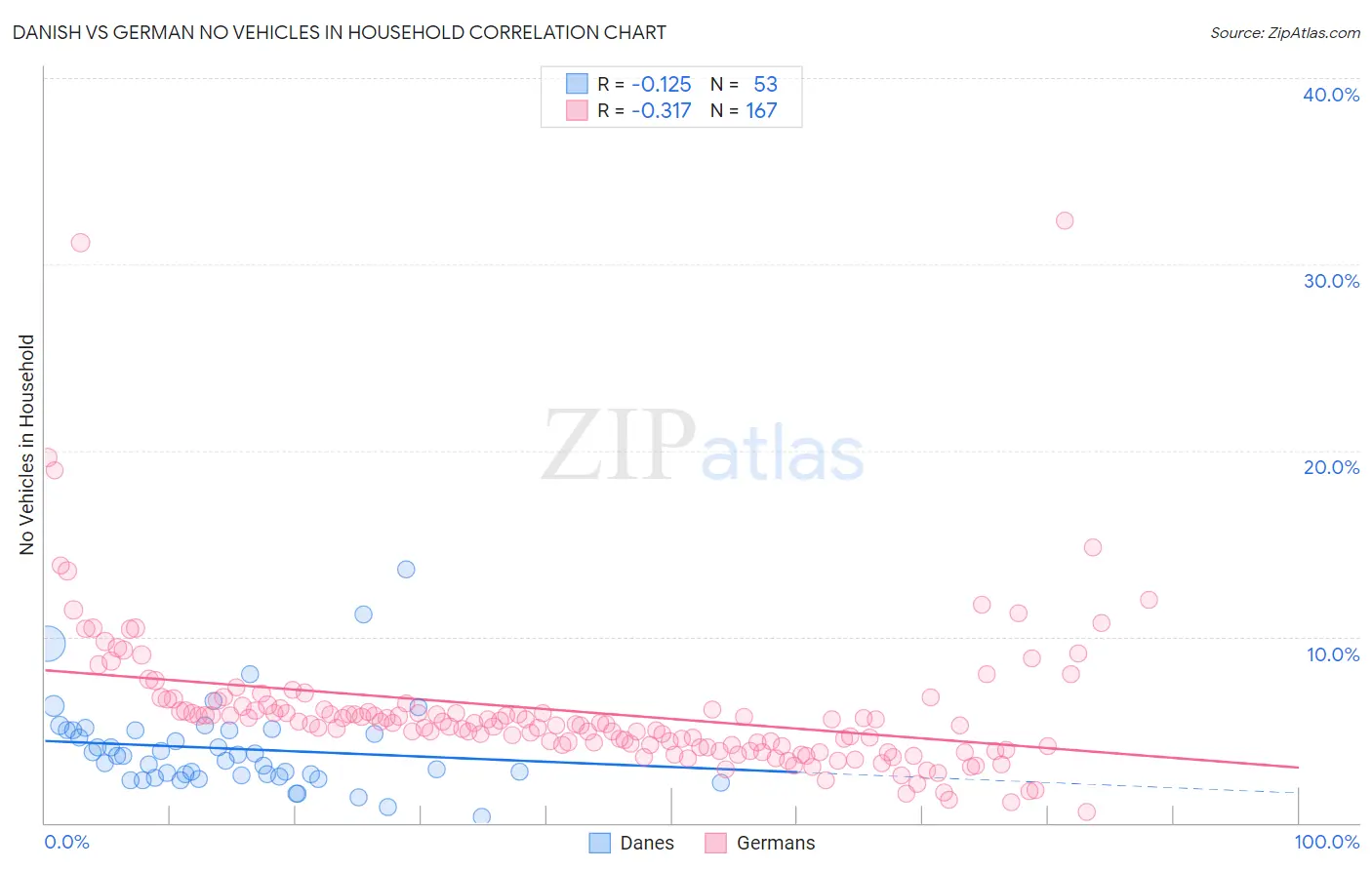Danish vs German No Vehicles in Household
COMPARE
Danish
German
No Vehicles in Household
No Vehicles in Household Comparison
Danes
Germans
6.6%
NO VEHICLES IN HOUSEHOLD
100.0/ 100
METRIC RATING
4th/ 347
METRIC RANK
6.7%
NO VEHICLES IN HOUSEHOLD
100.0/ 100
METRIC RATING
6th/ 347
METRIC RANK
Danish vs German No Vehicles in Household Correlation Chart
The statistical analysis conducted on geographies consisting of 471,573,050 people shows a poor negative correlation between the proportion of Danes and percentage of households with no vehicle available in the United States with a correlation coefficient (R) of -0.125 and weighted average of 6.6%. Similarly, the statistical analysis conducted on geographies consisting of 573,819,115 people shows a mild negative correlation between the proportion of Germans and percentage of households with no vehicle available in the United States with a correlation coefficient (R) of -0.317 and weighted average of 6.7%, a difference of 1.3%.

No Vehicles in Household Correlation Summary
| Measurement | Danish | German |
| Minimum | 0.32% | 0.56% |
| Maximum | 13.6% | 32.3% |
| Range | 13.3% | 31.8% |
| Mean | 4.0% | 6.0% |
| Median | 3.6% | 5.3% |
| Interquartile 25% (IQ1) | 2.5% | 4.1% |
| Interquartile 75% (IQ3) | 5.0% | 6.1% |
| Interquartile Range (IQR) | 2.5% | 2.0% |
| Standard Deviation (Sample) | 2.4% | 4.0% |
| Standard Deviation (Population) | 2.4% | 4.0% |
Demographics Similar to Danes and Germans by No Vehicles in Household
In terms of no vehicles in household, the demographic groups most similar to Danes are Yakama (6.6%, a difference of 0.35%), English (6.5%, a difference of 1.2%), Norwegian (6.4%, a difference of 2.3%), Scottish (6.8%, a difference of 2.7%), and Swedish (6.8%, a difference of 3.2%). Similarly, the demographic groups most similar to Germans are Yakama (6.6%, a difference of 0.99%), Scottish (6.8%, a difference of 1.3%), Swedish (6.8%, a difference of 1.8%), Scotch-Irish (6.8%, a difference of 2.0%), and Dutch (6.8%, a difference of 2.5%).
| Demographics | Rating | Rank | No Vehicles in Household |
| Luxembourgers | 100.0 /100 | #1 | Exceptional 5.4% |
| Norwegians | 100.0 /100 | #2 | Exceptional 6.4% |
| English | 100.0 /100 | #3 | Exceptional 6.5% |
| Danes | 100.0 /100 | #4 | Exceptional 6.6% |
| Yakama | 100.0 /100 | #5 | Exceptional 6.6% |
| Germans | 100.0 /100 | #6 | Exceptional 6.7% |
| Scottish | 100.0 /100 | #7 | Exceptional 6.8% |
| Swedes | 100.0 /100 | #8 | Exceptional 6.8% |
| Scotch-Irish | 100.0 /100 | #9 | Exceptional 6.8% |
| Dutch | 100.0 /100 | #10 | Exceptional 6.8% |
| Czechs | 100.0 /100 | #11 | Exceptional 6.9% |
| Assyrians/Chaldeans/Syriacs | 100.0 /100 | #12 | Exceptional 7.0% |
| Scandinavians | 100.0 /100 | #13 | Exceptional 7.0% |
| Mexicans | 100.0 /100 | #14 | Exceptional 7.0% |
| Whites/Caucasians | 100.0 /100 | #15 | Exceptional 7.0% |
| Europeans | 100.0 /100 | #16 | Exceptional 7.1% |
| Welsh | 100.0 /100 | #17 | Exceptional 7.2% |
| Tongans | 100.0 /100 | #18 | Exceptional 7.2% |
| Arapaho | 100.0 /100 | #19 | Exceptional 7.4% |
| Ottawa | 100.0 /100 | #20 | Exceptional 7.4% |